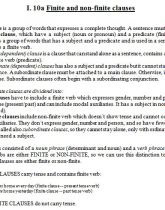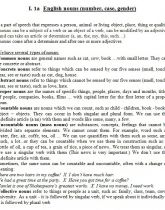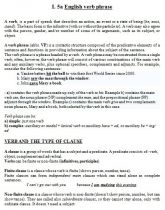Vypracované otázky: Vypracované okruhy z Anglického jazyka
Skrýt detaily | Oblíbený- Kvalita:82,8 %
- Typ:Vypracované otázky
- Univerzita:Masarykova univerzita
- Fakulta:Filozofická fakulta
- Kategorie:Jazyky
- Podkategorie:Angličtina
- Předmět:English language
- Autor:katerina.loumova
- Rozsah A4:78 strán
- Zobrazeno:1 669 x
- Stažené:2 x
- Velikost:0,2 MB
- Formát a přípona:Archiv souborů (.rar)
- Jazyk:anglický
- ID projektu:8688
- Poslední úprava:19.09.2016
I. 1a English nouns (number, case, gender)
= a part of speech that expresses a person, animal or living object, place, thing or quality
- nouns can be a subject of a verb or an object of a verb, can be modified by an adjective
and can take an article or determiner (a, an, the, my, this, such…)
- nouns come after a determiner and after one or more adjectives
We have several types of nouns:
Common nouns are general names such as cat, cow, book …with small letter. They can be concrete or abstract.
Concrete nouns refer to things which can be sensed by our five senses (smell, touch, hear, see or taste) such as cat, dog, house.
Abstract nouns refer to things which cannot be sensed by our five senses (smell, touch, hear, see or taste), such as love, hate.
Proper nouns are the names of specific things, people, places, days and months, titles of people, companies, books, films ... with capital letter for the first letter of a proper noun.
Countable nouns are nouns which we can count, such as child - children, book - books, object - objects. They can occur in both singular and plural form. We can use the indefinite article (a/an) with them and words like some, many, a few.
Uncountable nouns (mass nouns) are substances, concepts, feelings that cannot be divided into separate elements. We cannot count them. For example, word such as water, fire, air, coffe, tea, oil ... We can use quantifiers with them such as some, any, much, a lot...or they can be countable when we use them in construction such as: a bottle of oil, a cup of tea, a grain of rice, a piece of news...We treat them as singular, so we use a singular verb with them (This news is very important.) We don´t use the indefinite article with them.
Sometimes, the same noun can be countable and uncountable, often with a change of meaning:
There are two hairs in my coffee! X I don´t have much hair.
We had a great time at the party. X Have you got time for a coffee?
Hamlet is one of Shakespeare´s greatest works. X I have no money, I need work.
Collective nouns refer to things or people as a unit, such as: family, class, team, crew, university. As a unit - it is followed by singular verb, if we speak about it individually - it is followed by plural verb
= a part of speech that expresses a person, animal or living object, place, thing or quality
- nouns can be a subject of a verb or an object of a verb, can be modified by an adjective
and can take an article or determiner (a, an, the, my, this, such…)
- nouns come after a determiner and after one or more adjectives
We have several types of nouns:
Common nouns are general names such as cat, cow, book …with small letter. They can be concrete or abstract.
Concrete nouns refer to things which can be sensed by our five senses (smell, touch, hear, see or taste) such as cat, dog, house.
Abstract nouns refer to things which cannot be sensed by our five senses (smell, touch, hear, see or taste), such as love, hate.
Proper nouns are the names of specific things, people, places, days and months, titles of people, companies, books, films ... with capital letter for the first letter of a proper noun.
Countable nouns are nouns which we can count, such as child - children, book - books, object - objects. They can occur in both singular and plural form. We can use the indefinite article (a/an) with them and words like some, many, a few.
Uncountable nouns (mass nouns) are substances, concepts, feelings that cannot be divided into separate elements. We cannot count them. For example, word such as water, fire, air, coffe, tea, oil ... We can use quantifiers with them such as some, any, much, a lot...or they can be countable when we use them in construction such as: a bottle of oil, a cup of tea, a grain of rice, a piece of news...We treat them as singular, so we use a singular verb with them (This news is very important.) We don´t use the indefinite article with them.
Sometimes, the same noun can be countable and uncountable, often with a change of meaning:
There are two hairs in my coffee! X I don´t have much hair.
We had a great time at the party. X Have you got time for a coffee?
Hamlet is one of Shakespeare´s greatest works. X I have no money, I need work.
Collective nouns refer to things or people as a unit, such as: family, class, team, crew, university. As a unit - it is followed by singular verb, if we speak about it individually - it is followed by plural verb



